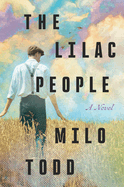
With The Lilac People, Milo Todd delves into the nearly lost history of trans people in the Holocaust. Integrating imagined characters with historical research, Todd's novel brings humanity and specificity to atrocities that are still being uncovered. The heartbreaking result honors love and friendship, and ends with hope for one built family of survivors.
The opening pages find Bertie on the outskirts of the German city of Ulm in 1945. He has ridden out the war with his partner, Sofie, "on a little farm that was not theirs," growing vegetables, raising chickens. Then, weeks after the news that the Allies have freed camp prisoners, Bertie finds a young man in the garden, dressed in rags from the camp and barely alive. "[The Allies] sent all the pink triangles to jail. And all the black triangles that qualified the same," he tells Bertie. He wears a black triangle. He is a trans man--like Bertie.
Karl's appearance takes Bertie back to 1932 Berlin, where Bertie assists Dr. Magnus Hirschfeld at the Institute for Sexual Science and is a member of a vibrant queer and trans community, with a tight-knit group of friends that is lost on the Night of the Long Knives. Karl's existence brings hope, guilt, and memory. To save Karl and themselves, Bertie and Sofie must leave the farm's relative safety.
The Lilac People is emotionally wrenching, but also lovely in its details, the humanity of its characters, and the resilience and hope at its end, when a fresh start seems possible. Todd has made an enormous contribution to historical fiction with his own research and this beautiful, touching narrative. --Julia Kastner, blogger at pagesofjulia

